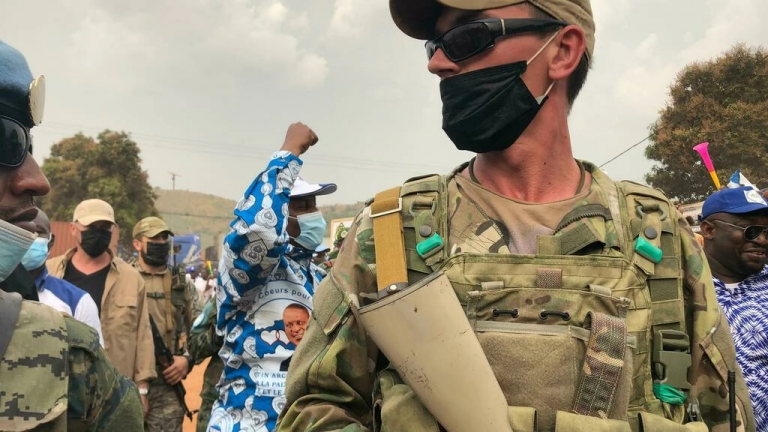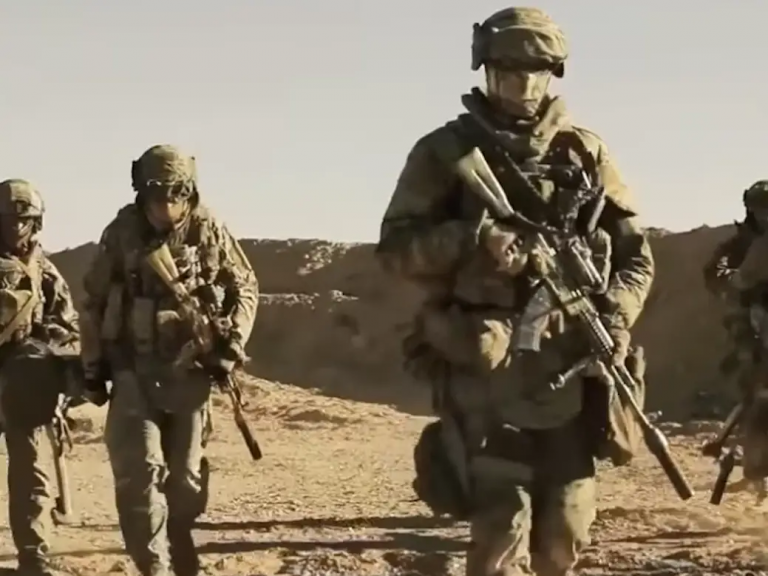Lenta.ru: "Thugs with hatchets at the ready"
The true face of Russian mercenaries and the secrets of PMCs: an exclusive interview with Lenta.ru
Interviewed by Alexandra Vigrizer – February 21, 2018
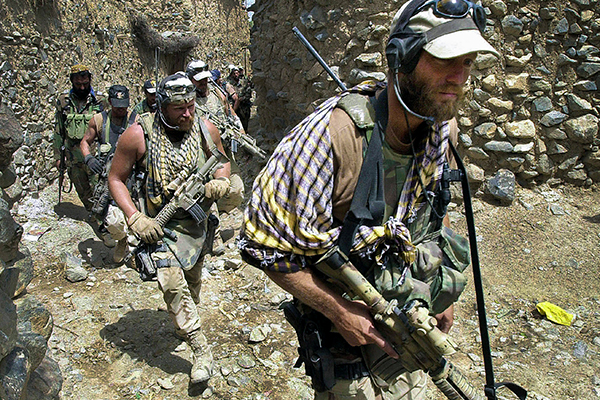
To see the world, to visit unusual countries, to meet wonderful people and shoot them, simultaneously earning a lot of money – the work of a mercenary in a private military company (PMC) at first glance is very attractive. But in fact, everything is much more complicated: some volunteers chasing a long ruble can return home in coffins, while others do not smell gunpowder at all. Lenta.ru’s special correspondent Alexandra Vigrizer spoke on condition of anonymity with an employee of one of the world’s largest private military companies and found out why the semi-legendary Wagner PMC cannot be called a private military company, how “soldiers of fortune” live and what they fear.
Lenta.ru: What do you know about the Wagner PMC? How and for whom does it work? Why is their existence allowed in Russia?
All the information is on the surface. Everyone knows where their Moscow office is located. Yes, this is the structure of Yevgeny Prigozhin. Why is this private military company (PMC) allowed to operate? It’s hard for me to understand. I can assume that it’s all about the relationship of a particular person with a particular president. This practice has no world analogues.
If people are fighting for the country, then it should not be “green”, “yellow” or “blue” men, but military personnel. If people are engaged in private security, training or risk analysis, then it can be a private military company. But PMCs cannot fully participate in hostilities. Because PMC employers and the state may have completely different goals. The state, for example, sets some global tasks, and a particular businessman is interested in the seizure of an oil refinery. And who? The Kurds!
What’s wrong with the Kurds? Aren’t they as adversary as anyone else in Syria and Iraq?
Are the Kurds the enemy?! Trust me: anyone who has worked in Iraq prays for the Kurds. Iraqi Kurdistan, for example, looks like an oasis in the middle of the desert. It’s an amazing place! Lovely, kindest people without any signs of Islamic fundamentalism. Girls on the streets walk in T-shirts and capri pants, alcohol is sold everywhere, whiskey is openly advertised on the street! These are the most normal, the most adequate, the most rational allies of any adequate forces in the Middle East.
Offending the Kurds, fighting the Kurds is the worst thing imaginable. Moreover, the Kurds have a great attitude to Russia, love it. And now the activities of some cooks lead to the fact that the whole of Kurdistan (the Syrian, Turkish, Iraqi and Iranian parts of it) simply turn away from the partner. Come to Kurdistan and see: Gazprom works there, there are Russian guys from PMCs there. They are engaged in normal work, receive normal money. There is cooperation with local security companies. They do a good job there without any “law on PMCs”, without presidential chefs.
The Kurds have a great attitude towards Russia. In Syria, at the instigation of some narrow-minded head of the farm, a political crisis is taking place, hundreds of Russian people are dying. It’s a madness that needs to stop. I have worked in this field all my life and I can say what is happening behind the sign of the “Wagner PMC” – this is abnormal, this should not exist.
In this case, can the Wagner PMC be called, so to speak, the Russian army in a different “outfit”?
This is not the Russian army. There is, after all, the well-known word “mercenaries”. Any army officer is limited by certain laws and a hierarchy of command. And Wagner… They simply do not have the brakes that a huge inertial military machine has. Any order in the official structure would pass through a huge number of instances – yes, stupid, but instances. And the Russian army is not going to fight the Kurds. So no.
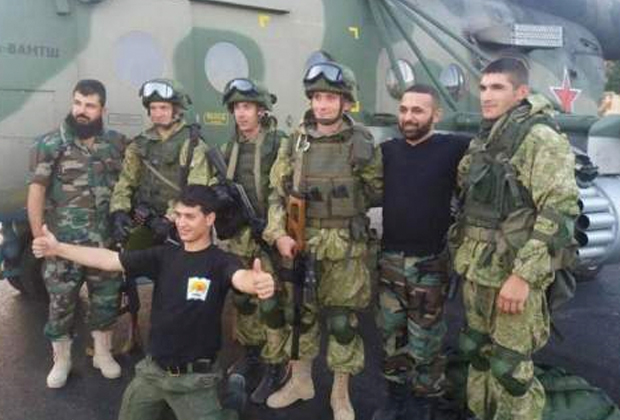
Another sad side: Wagner’s personnel, to put it mildly, are of a completely different quality. And then on points: the equipment and weapons are disgusting, the level of training is low, the effectiveness of the command also leaves much to be desired – there they have people dying constantly. This is well known in our circles. And therefore, the attitude of career Russian soldiers and officers to them is appropriate.
But there is still a moment about which it is impossible to remain silent. When a Russian pilot dies, he is buried with honors, broadcast on television, you write in your newspapers panegyrics and obituaries what a good guy he was. And rightly so. But here – by stupidity, by monstrous stupidity, more than a hundred people die. And what do they write about them? Have you seen this “troll factory”? “Oh, mercenaries, why feel sorry for them” is some fantastic level of hypocrisy, when ordinary guys from the outback are sent to die hell knows where for money, and then buried in unmarked graves.
And if they were contract soldiers in the army, would it be better?
Of course. First, it’s a completely different attitude. Secondly, the army provides a number of bonuses. This includes citizenship, pension, and much more. And the main thing is the status of a legitimate participant in hostilities, as well as some kind of immunity from local laws. A soldier of the Russian army will not be handed over to a Syrian court, a soldier of the French foreign legion will not be put on trial in Mali.
And the PMC employee is a civilian. If Wagner employees had the full status of military personnel, I personally would have nothing against it. For example, a man dies, and the mother may say to his child: “Son, your father was a soldier, and he died as a hero, fought terrorists.” Now what? Son, your dad wasn’t sure who was doing what there – we were never told, he died when the stupid oligarch wanted to squeeze the oil field.
There was a precedent in history when the UAE hired about two thousand Colombians for the war in Yemen. And they hid even – like the Russian authorities – but they took them into the army, paid a very decent salary. And these were official soldiers in the service. So no, the Wagner PMC is what is called in Russian an “illegal armed formation”, which is incomprehensibly subordinate to whom and is capable, thanks to the stupidity of its commanders, of provoking a huge international conflict. As a person who has been working almost all his life in this area, I strongly support its development, but such formations are harmful not only for the industry, but also for the image of Russia.
Why are you saying that Wagner has a lower contingent than the army?
Look: anyone in our field personally knows someone who serves there, or someone who refused their offer. But no one knows of a volunteer who would be denied admission to Wagner’s PMC. They take everyone: people with criminal records, with alcohol dependence – all in a row.
It is enough to talk with their employees to understand that they are not the same level as the Special Operations Forces, they do not always reach the usual construction workers. Not in terms of education, not in terms of military training, not in terms of motivation. Again, I have a lot of respect for those who work there. But let’s be honest: professionals don’t go there. They don’t need such a “beautiful” job, such an “amazing” opportunity to die even without a guarantee that your corpse will at least be returned home. None of the Russians I know – those who worked in Iraq in the early noughties, who are now working with Gazprom in Kurdistan – no one went there, because everyone understands that this, as they say, is a travesty.
Is there such a thing that a private company conducts full-fledged hostilities, and even with such losses? According to various sources, among the mercenaries of the Wagner group there could be up to two hundred dead.
Absolutely not. It is impossible to even imagine that now some Western PMC, an official company, is conducting hostilities. This is absolutely absurd. There was a precedent with Executive Outcomes, which participated in several civil wars in Africa, but that was in the early ’90s. Since then, the world has changed.
The South Africans fought in Nigeria a few years ago. But some large international companies were not involved in this. This is a specific situation when specific people are recruited for specific work, whose activities are initially completely outside the legal field. Therefore, Wagner is, of course, not a PMC. You can call it whatever you want, but in the Russian criminal code it is called an “illegal armed formation”. I have nothing against the people who work there – I understand their motivation, I respect them as professionals, but you need to understand that this situation is not normal. Nothing like this can happen in any Western PMC.
Doesn’t Wagner’s PMC work in the Russian legal field?
Of course not. On what basis are weapons transferred to people, on what basis do they conduct hostilities? I’m not a Syrian lawyer, I don’t know what the laws are. But, in my opinion, the “Wagnerians” do not work either within the framework of Russian law or within the framework of the Syrian one. This is, as you like to say, “an education that has no analogues in the world.”
But why do people go there? Work with a very high risk, with the possibility of a banal bullet in the forehead or a term for mercenarism?
I have not lived in Russia for a long time, but it is obvious that there is only one answer here – despair. Your economic situation, especially in the regions, is difficult. A lot of people have served in the army and believe that they can’t do anything else. They don’t know how to serve, really. But at least they identify as great warriors. Plus, you need to understand that in society there has been a certain militaristic pumping and propaganda for many, many years.
So despair, lack of money and skills, extremely high housing prices, lack of affordable loans – these are all factors. Even with such losses, I am afraid that there will be a lot of people who want to get a job at Wagner. Especially from small towns. Look at the known lists of casualties: there is almost no one from Moscow or St. Petersburg. These are all small towns where people have long lost hope. And the amount of 200 thousand rubles, which the dishwasher receives in Britain, makes people forget about everything and go to nowhere, not giving a damn about the instinct of self-preservation.
Okay, I understand with the Wagnerians. And what about normal PMCs? In the Russian media, mercenaries are presented as heroes eager to fight in the most dangerous parts of the front. How true is this image? What do private military companies do in general?
Completely untrue. For a long time there are no bearded uncles with tattoos, dissecting on jeeps in the desert and shooting at anything with a machine gun. 80-90 percent of businesses are absolutely standard things. We need to hang cameras, look at monitors, stretch barbed wire, provide drivers, technical reconnaissance equipment, and do analytics. The “bearded thugs” who are used to represent PMC employees are a minority, and a vanishing minority in this business. In fact, the work of PMCs is the work of watchmen, absolutely devoid of romanticism.
In general, there is a stereotype that the main work of a private military company is an armed guard. But this should not be the case: this situation has developed only because at one time Iraq and Afghanistan simply did not have a capable government and crowds of adventurers with weapons gathered there.
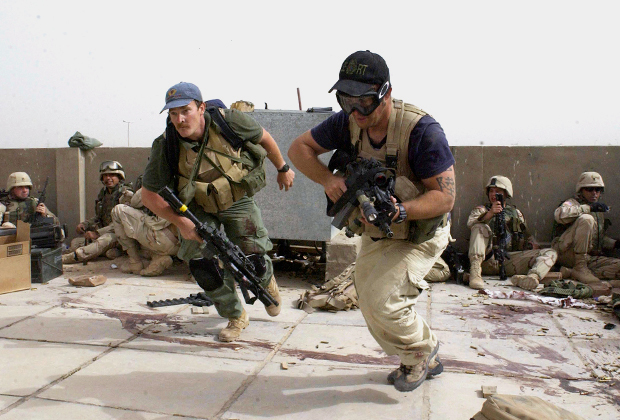
We have a lot of talk that we need a law on PMCs that would regulate their activities… These conversations make me laugh. In America, which everyone nods at, there is no separate law on private military companies, and they do a good job. I do not follow what is happening in Russia at all, but I often see what Russian journalists write about PMCs, and I laugh at it. I was by the recent situation in Syria.
Firstly, people died there, and secondly, everyone immediately began to tell: they say, everything is fine, these are mercenaries and why feel sorry for them. So here we are. This is all said by clowns who have no idea what a PMC is and how it all works. Because nothing like what happened to the employees of the Wagner PMC in Syria simply could not physically happen in an American, British, or even Afghan company.
Why?
Let’s just open our eyes and look at what a PMC is. I’ll decipher the abbreviation for those who don’t know. A PMC is primarily a company – a private military company. An indispensable condition for its existence is the legality of activity. Now the most important and most necessary person for a PMC is not a thug with a hatchet at the ready, but a coordination manager – a specialist who monitors that all the company’s activities comply with local laws.
And a PMC, by definition, cannot work outside the legal field, outside the law, because then it is no longer a company. It’s a criminal organization, a gang — anything but a PMC. And when we work now in unstable regions and read the stories of various Russian propagandists, it becomes funny at first, and then it is scary.
And a hard regime is usually established?
In general, everything is described as exhaustively as possible by the contract, which is signed in each individual case. But the main thing: any employee is fully subject to the laws of the country where he works. In fact, this is a four-component system: first local laws, then the laws of the customer country, then the laws of the country in which the PMC is registered, then the contract. Each layer has additional constraints.
And now imagine how strictly this regulates any activity, how great the role of lawyers who must understand all the conflicts, what bureaucratic machinations need to be turned in order to begin to fulfill contractual obligations.
After all, even a contract is not a contract for a page where it is written that company “A” protects employees of plant “B” and two signatures are worth it. It’s a huge, eight-hundred-page talmud that puts the performer in an extremely rigid framework. It even talks about the standards of behavior, about sexual harassment!
And in Russia, everything is the same. Just one light from VGTRK said: “During the second assault on the Iraqi city of Fallujah, Blackwater played a key role, in fact acting first as a barrage detachment, and then as the main force of the breakthrough.” I usually laugh when I read this, but then I wanted to find this person, take him by the collar and ask: “Clown, what are you carrying?!”
However, for some reason, this “four-component system” could not save Iraqi civilians from the tragedy when employees of the American company Blackwater shot civilians in Nisour Square in Baghdad in 2007.
Faithfully. I will not touch on what was there – this is a topic for a separate conversation. But contrary to fairy tales in the press, the participants in these events were tried, and in 2014 four were imprisoned. One for life, three others were given 30 years. This is not an isolated case: the British are sitting in India, who simply accidentally swam into Indian territorial waters.
Under these conditions, it is ridiculous to say that PMC employees are “above the law. On the contrary, they are not only forced to comply with all laws, they are regularly invented new restrictions. Now even the language is being revised. For example, the term “rules of fire” is abandoned because it sounds too belligerent, it is replaced by a neutral “rules of engagement”.

As I said, the space for activity is constantly shrinking. In 2004, There was complete freedom in Iraq, but now Baghdad is doing everything to ensure that only local mercenaries remain in the country. Now it is possible to act freely in completely non-existent countries like Syria.
Frankly confuse the conversations of our deputies and other experts that Russian PMCs will work somewhere , there is a complete misunderstanding of the situation and its context. In a few years, foreigners will remain only on large projects: the protection of embassies, key infrastructure, and then everything without exception will go to local.
Is hiring locals a whim or a necessity?
Let me give you a simple example. That in Iraq, that in Afghanistan there are always local drivers at PMCs. Why? It’s simple: if a citizen of another country got into an accident or, God forbid, crushed someone, then he will simply be sued, or even put in prison for decades. Therefore, they take a local one, so that in case of anything you can disown him.
I recall just two exceptions. The period from 2003 to 2006 in Iraq, and from 2001 to 2004 in Afghanistan. Back then, you could be above local laws, simply because they didn’t actually exist. You arrived, there were no visas and passport control, right on the runway you received an automatic gun and drove to the villa with complete “immunity”. But then in Iraq, for example, there was no state. There was the American ambassador, Paul Bremer, the head of the occupation government and essentially the supreme ruler of Iraq. In that particular historical period, PMC employees could indeed enjoy a certain immunity.
Now the situation is fundamentally different. Without permits, licenses, you can’t step in. They banned the use of the PKM (Kalashnikov machine gun), then took away the RPK (Kalashnikov light machine gun), and even confiscated two SVD rifles (Dragunov sniper rifle). They left the usual Kalashnikovs and pistols. Only local contractors help out – they have access to government offices, can avoid prosecution for minor violations, know the language, local realities. And hiring them cheaper is a banal business logic. They can be paid pennies.
The only exception is American government contracts, which recruit only US citizens, because only they can issue the necessary form of admission to secrecy. They have all the employees — Americans, even those who are standing on the gate. Only due to this, there is some work, because you simply cannot hire a foreigner there. If there is no requirement for secrecy, they will hire locals. True, their qualifications, as a rule, are almost at zero.
We see the results, remember the recent attack on a hotel in Kabul (then, as a result of a Taliban attack on a hotel populated mainly by Western officials, 43 people were killed – Lenta.ru note). Obviously, this hotel is the number one target for all villains, but even it was guarded by local clowns who fled at the first sounds of gunfire.
But the local employee needs to understand: you live there, you have a family. Today you are defending some foreigner for money, and tomorrow your family will be stabbed for it by the Taliban. So even if you are a professional, you can’t expect much from you. The only exception is the Kurds. They’re really handsome. First, the society there has a positive attitude towards foreigners. Foreigners bring money, not war. No one will hurt your family if you protect foreigners. Secondly, many of them are really competent guys, they know the math, they speak English well. It’s a pleasure to work with them.
What is the current ratio of “militants” and organizers, managers, analysts in companies?
It all depends on the specific contract. But in reality, in many countries where there is a fierce need for security, it is simply impossible to work with weapons. Nigeria is a monstrous, scary place, but whoever you are, you can’t work with guns there. Mexico, where cartels kidnap 50 people every day, is impossible. The only way out is if an armed group of Mexicans works with you, and at a critical moment you can snatch a rifle from their hands and begin to administer justice.
But in fact, always with any contract, the number of armed foreigners is less than half, and maybe no one at all. Now it is much easier to hire a local for running around with a machine gun. And the authorities will be grateful. As a result, we have a huge number of people willing to work and a very, very small and constantly decreasing number of vacancies.
How big is the market for private military companies?
The total volume of the industry around the world is 171 billion dollars. But it is already divided between very large corporations. All the significant companies in this field over the past four years have been bought by multinational security players who do not know how to work in high-risk situations.
Now in the West, there are practically no small and medium-sized players left in this activity. The market consists of international corporations and regional contractors on the ground. The reality is that the market for armed security, the one that you journalists love to talk about, is by no means increasing.
On the contrary, it is decreasing every year. And the reason is very simple: no normal state will allow the presence of foreigners with weapons on its land. Do you often see armed citizens of other countries in Russia? Foreign guards with machine guns, pistols that protect someone? No! Any state, even such failed countries as Iraq or Afghanistan, now leads foreign PMCs into such a narrow framework that work becomes almost impossible.
Who do PMCs usually work for? On the state?
It’s confusing. Private companies mainly fulfill the orders of private business. It is impossible to even imagine that a Western or even Afghan or Iraqi large company would work only with the state, only for the state, and even in this form, openly participating in hostilities. Although state contracts are always very profitable – this is either the protection of representatives of a particular state, or the protection of embassies, which is very monetary.
What do states usually entrust to private military companies?
Analysis of intelligence, risk analysis, protection of embassies and diplomatic representatives, ensuring the security of various CIA facilities, if we are talking about American contracts. Once there was a case when the Pentagon instructed PMCs to protect the corps of military engineers of the American army – the Ministry of Defense in that region did not have enough of its own forces. Stories about contractors being charged with some political assassinations are fairy tales, of course.
Cannon fodder, assault squads – this is not all about PMCs. It was all in the ’60s and ’90s and ended with Sandline and their attempted coup in Papua New Guinea. This was probably one of the last cases when someone tried to hire a PMC for some semblance of fighting.
That is, there were still such precedents?
A lot of literature has been published on this topic: the heyday of mercenarism fell on the 60s of the XX century. Dogs of War, Bob Denar, everything. A legendary figure. In the early 60s, he resigned from the army, went “to civilian” and began to sell washing machines in Paris. He quickly got fed up with this, and he took up the old thing: in fact, he worked for the French government where it did not want to shine. But, let’s just say, he did not take away the oil fields in the interests of the French bourgeois from the Kurds.

But he was lucky to some extent: Denard didn’t die in prison just because he had Alzheimer’s. By the ’90s, all state games with mercenarism were over. The old man was dragged through the courts until he died, and no old merits helped. So in Russia, as often happens, they decided to pick up a forgotten trend.
But can’t we say that Syria is the same failed state as Iraq was during the American occupation?
Essentially not. It’s a funny conflict. If you look from the position of Russia, then this is a completely established country with a government and laws. A beautiful state, where happy people idolize President Bashar al-Assad, are devoted to him with all their hearts, are very glad that the war with the “Islamic state” (banned in Russia – note “Lenta.ru”)) is over.
That is, there is no such thing that we came, threw Assad off the throne, installed our supreme ruler. No, we supposedly respect Syrian laws and their authority. But if power and law are when “Assad allowed” another state to form illegal armed groups on its territory and use them in war, then this is just an example of a failed state.
It is unlikely that Syrian law allows the creation of illegal military formations on its territory and their conduct of independent hostilities. However, I am not a lawyer and I am not going to go to Syria.
For many Wagnerians, war is just a way to make money. There is information that employees receive three thousand dollars for a month of active hostilities and half of this amount during their stay at the base. How close are these numbers to reality and how do they relate to regular salaries in this industry?
Let’s put it this way: they are close to reality. People from there talk about such amounts. But in general, you need to understand that even in hot spots, it is not every day that evil terrorists with knives rush to your base. The lower the level of risk, the more idiots you can hire for this job. Therefore, often, when you can take a person, let’s say, with low salary expectations, they will hire him.
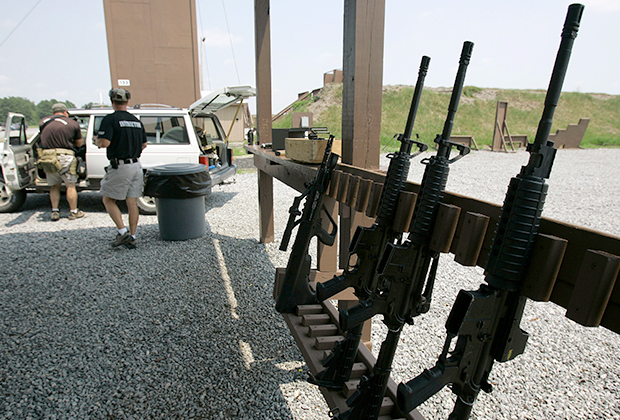
It started back in the 2000s, when Chileans were hired for pennies, then it came to Ugandans. I worked with them in an African country – these comrades can’t even shoot a machine gun normally. If there is an opportunity, and the risks are small, they always hire the cheapest.
So in the field of maritime security, where it all started with salaries of six hundred dollars or six hundred pounds a day, salaries fell to ridiculous numbers. Recently, I saw an ad offering jobs to Ukrainians on the terms: 30 days at sea for $ 800. I discussed this in Iraq with a colleague from India and, to tell the truth, he almost died of laughter. Because it’s ridiculous money. But the Ukrainians are going for it. Therefore, it is difficult to talk about any average market wages. It very often falls, because they hire for pennies local or representatives of poor countries, including Romanians, Gurkhas, Indians, Ukrainians, Ugandans.
There are more prestigious contracts, where very high requirements for personnel are put forward. In this case, certain standards of payment are implied: for serious high-quality work, you can get about 10 thousand dollars a month. Few people rise above this bar.
Is it really necessary to compete at a high level?
Recently, there was a tender for the protection of the Australian embassy in a fairly “good country”. So: just to show up, you need a huge investment at the very beginning. Yes, they pay very decently for such a contract, but the problem of Russian companies is that there is no such business in this area that would be ready to go to the end and invest real money. There was a perfect example of the company “LUKOM-A”, which recruited people and was going to go to work in Iraq. They just weren’t given a license to operate.
No one in Iraq or Afghanistan needs new players. There are local companies and the largest international corporations that can afford it. So the development of the Russian segment of PMCs will depend only on the development of domestic business. Once there is a critical number of projects to guard, there will be a security business. You need to understand that the need for it already exists, but it is not fully realized.
Look at the most egregious case – the murder of the Russian ambassador in Ankara. Where was his guard? It just wasn’t there. She was in Moscow. The unit that deals with the security of the diplomatic corps is simply not able to provide protection to everyone who needs it. All countries are engaging private security professionals for these tasks.
But our state, instead of supporting the development of a normal healthy industry, is engaged in the creation of pocket illegal formations like Wagner. At the same time, Russian diplomatic representatives in countries with a huge level of danger are simply not protected by anyone. If this insane practice continues, it will continue to cost the lives of Russian diplomats.


